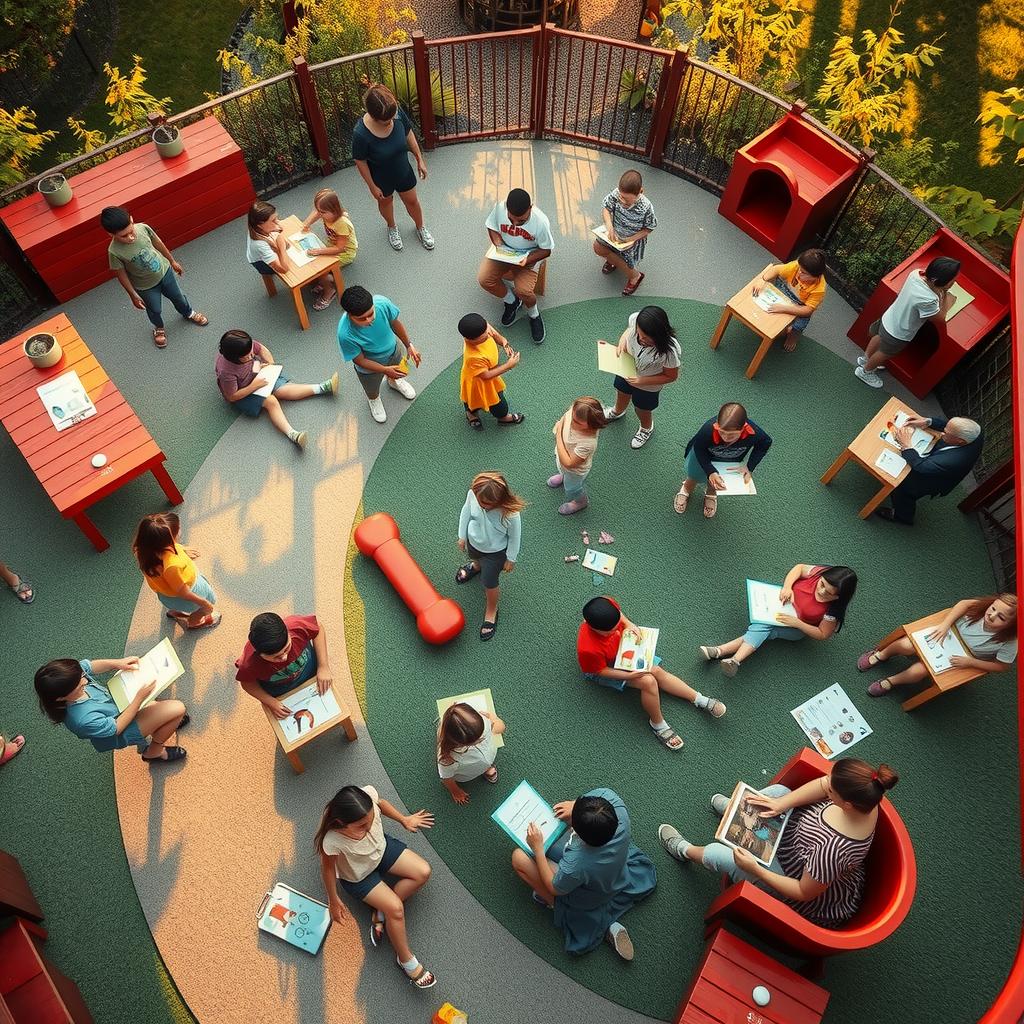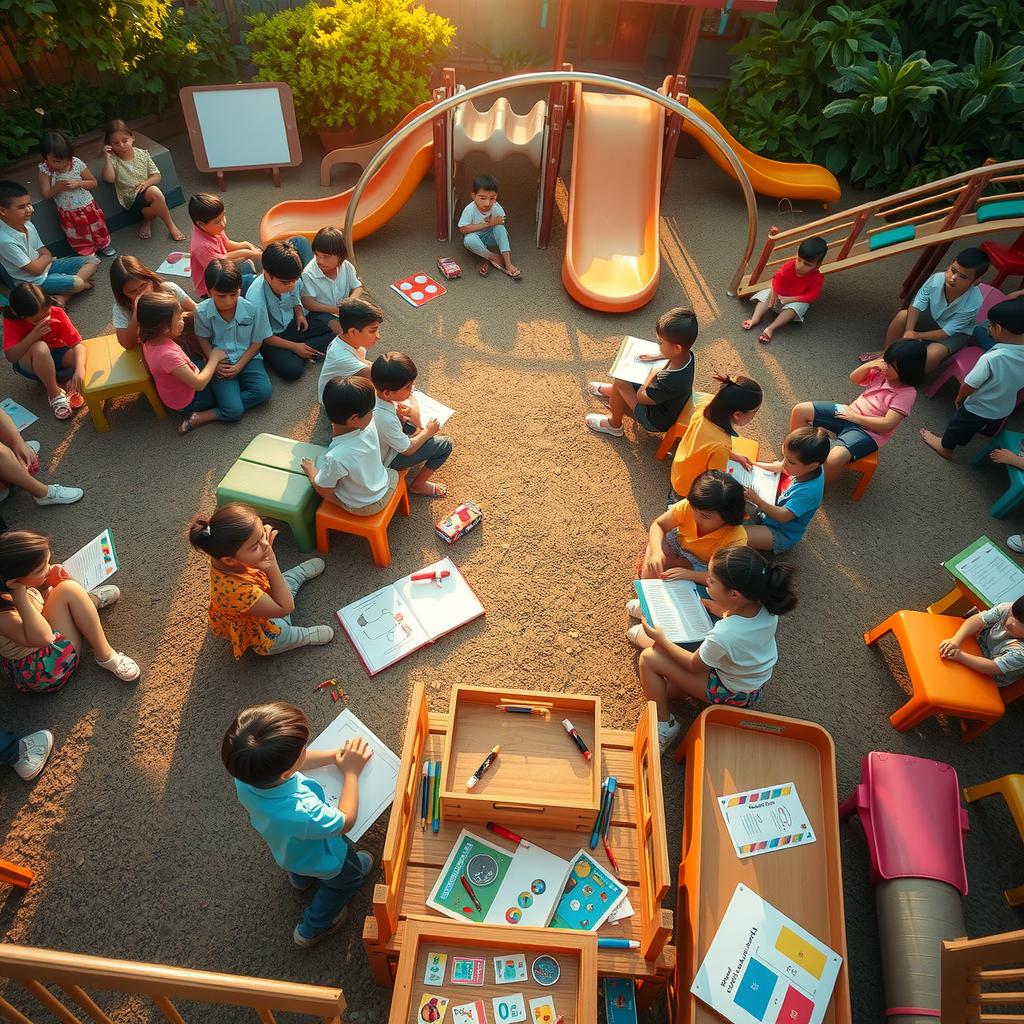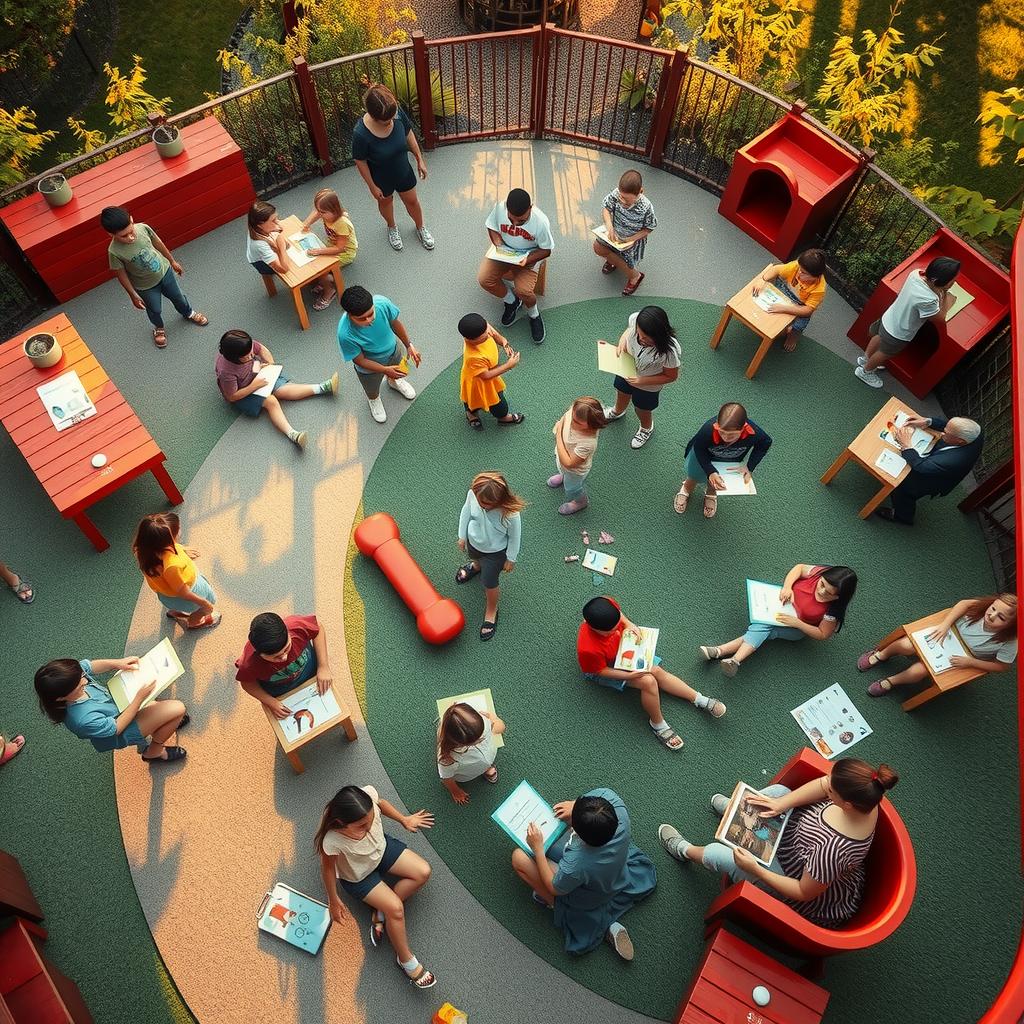In a world increasingly dominated by screens and structured environments, the question arises: how can children truly engage in meaningful learning experiences? The answer lies within the realm of playground based learning programs—an innovative approach that champions child development through play. These programs harness the natural curiosity of children, providing them with opportunities to explore, interact, and learn in dynamic outdoor settings. By integrating educational principles into playful activities, they create an environment where learning through play is not just encouraged but celebrated.
The core value of these playground based learning programs is their ability to facilitate active learning while promoting essential skills such as social interaction, problem-solving, and creativity. Unlike traditional classroom settings that often prioritize rote memorization over experiential understanding, these initiatives embody a philosophy rooted in experiential learning. Children are not merely passive recipients of knowledge; rather, they become active participants in their own education. This shift transforms ordinary playgrounds into vibrant classrooms where every swing set becomes a lesson and every climbing frame offers new challenges.
Moreover, research supports the notion that outdoor education significantly enhances cognitive development and emotional well-being among young learners. Engaging with nature stimulates exploration and inquiry—key components of effective skill development. As children navigate physical challenges on playground structures or collaborate with peers during group activities facilitated by these educational programs, they concurrently build resilience and adaptability.
As we delve deeper into this topic throughout the post about playground based learning programs, readers will discover practical insights on how to implement such initiatives effectively within various educational contexts. From urban schools looking to integrate more green spaces for student engagement to community centers aiming to provide diverse recreational options for local youth—this exploration promises solutions tailored for different environments. Join us as we uncover how fostering learning through play can reshape our understanding of childhood education while enriching children’s lives holistically.

Key points:
-
Title of the key point: Holistic Skill Development
Playground-based learning programs foster a comprehensive range of skills necessary for child development. By engaging in structured activities within natural settings, children enhance their social interactions, problem-solving abilities, and critical thinking skills. This active learning environment allows participants to collaborate with peers, negotiate roles in group play, and navigate challenges together—all vital components that contribute to holistic growth. -
Title of the key point: Physical and Mental Well-Being
Outdoor education integrated into playground-based learning programs significantly boosts both physical health and mental well-being among children. As they participate in various physical activities such as climbing and running, children develop motor skills essential for their age while simultaneously reaping the benefits of fresh air and nature. The connection between outdoor exploration and enhanced mood is particularly noteworthy; immersing kids in stimulating environments promotes emotional intelligence alongside academic engagement. -
Title of the key point: Fostering Creativity Through Exploration
Engaging with playground-based learning programs ignites children’s creativity by providing them ample opportunities for experiential learning. When allowed to explore unstructured play areas creatively, young learners can express themselves freely—whether it’s building imaginative structures or inventing games on the spot. This freedom nurtures resilience as they learn from successes and failures alike—a crucial aspect that prepares them for future challenges both academically and personally.
The integration of playground-based learning programs into early childhood education represents a transformative shift towards fostering child development through innovative methodologies. These educational frameworks prioritize not just knowledge acquisition but also holistic skill-building necessary for thriving individuals equipped with life-long tools to succeed beyond traditional classroom walls.

Understanding Playground-Based Learning
A Comprehensive Framework for Child Growth
Playground-based learning serves as a vital medium through which children can engage in experiential education, fostering their overall development. This approach emphasizes the importance of active learning, wherein children explore and interact with their environment, leading to enhanced cognitive, emotional, and social skills. By participating in structured yet flexible playground learning programs, children navigate a landscape filled with opportunities for discovery and creativity. These programs are designed to promote not just physical activity but also critical thinking and problem-solving abilities that are essential for lifelong success.
Through outdoor education initiatives embedded within these playground-based learning frameworks, educators provide a rich tapestry of experiences that stimulate curiosity and collaboration among peers. For instance, activities such as obstacle courses or team sports encourage teamwork while developing motor skills—key components of child development. The holistic nature of this educational model recognizes the interconnectedness between various developmental domains; thus, it is equally effective in nurturing interpersonal relationships along with individual competencies.
Furthermore, learning through play acts as an organic catalyst for skill development. Children experiment with roles during imaginative play scenarios that mimic real-world situations—this not only enhances social-emotional growth but also improves language acquisition through dialogue exchanges among peers. According to research conducted by various educational specialists (referenced studies emphasize the positive correlation between regular engagement in playground activities and improved academic performance), active participation in such environments lays down foundational skills that extend well beyond childhood.
Incorporating elements like sensory-rich materials or interactive installations into playgrounds adds another layer to experiential learning by captivating children’s attention while teaching them about cause-and-effect relationships inherent in their surroundings. As they climb structures or navigate slides, they experience challenges firsthand—a crucial aspect of self-regulation often overlooked within traditional classroom settings.
Ultimately, embracing a holistic approach to child development via playground-based learning equips individuals not only academically but socially and emotionally as well—preparing them for future challenges both inside and outside school walls. Parents looking to enrich their child’s formative years should consider enrolling them in dedicated educational programs focused on leveraging the power of play where exploration meets structured guidance; thereby cultivating resilient learners who thrive amid life’s unpredictability.
Enriching Development Through Play
Unleashing Potential via Outdoor Experiences
The essence of playground-based learning lies significantly within its capacity to foster resilience and adaptability among young learners through carefully crafted outdoor experiences. Engaging children outdoors allows them freedom—from unrestricted movement across expansive spaces—to express themselves creatively while refining motor skills essential for physical health during these formative years. Each swing taken or slide navigated provides unique lessons about balance—not just physically but metaphorically—as they learn how persistence pays off after repeated attempts at mastering challenging feats.
Additionally, integrating environmental awareness into playful interactions can enhance children’s understanding regarding sustainability practices early on; thus promoting responsible citizenship from an impressionable age onward when combined effectively with existing curricula based around environmental science topics found within modern classrooms today! Herein lies one advantage: seamlessly blending fun-filled adventures amidst nature alongside key academic themes ensures students remain engaged even when tackling complex subject matters traditionally perceived as dull or arduous tasks otherwise uninspired minds would shy away from altogether!
Moreover—and perhaps most importantly—the intrinsic motivation derived from participation cannot be overstated! When students feel empowered by having agency over their choices during engaging activities aimed towards broader goals tied directly back into enhancing personal growth objectives set forth jointly amongst educators & parents alike—they develop stronger connections towards both peers & mentors guiding them throughout this journey together ultimately culminating toward becoming well-rounded adults equipped ready take on whatever life has awaiting ahead!
Thus encouraging involvement within inclusive community-centered recreational opportunities opens up doors previously thought sealed shut offering pathways leading toward achieving fulfilling lives driven passion fueling dreams nurtured since youth all thanks largely due influence created therein surrounding those pivotal moments spent exploring wondrous worlds conjured up simply utilizing imagination paired cleverly alongside supportive mentorship afforded continuously throughout every step along way forming bonds lasting lifetimes worth treasuring deeply held dear forevermore!
Fostering Emotional Intelligence
Cultivating Social Skills Through Interaction
Emphasizing emotional intelligence is paramount when discussing the advantages brought forth by implementing strong foundations rooted firmly grounded principles associated primarily revolving around successful execution strategies encompassed under umbrella term known broadly regarded universally recognized concept referred commonly termed “play.” As youngsters immerse themselves fully indulging actively participated enabling authentic dialogues ensue naturally emerging organically stemming direct encounters shared collectively experienced whilst navigating diverse terrains together building camaraderie forged friendships blossoming effortlessly arising spontaneously resulting harmonious outcomes mutually beneficially nourishing spirits positively uplifting morale sustaining enthusiasm invigorating vitality throughout entire group dynamic creating atmosphere ripe conducive flourishing collaborative undertakings desired upon seeking meaningful engagement day-in-day-out enriching everyone involved thoroughly transforming ordinary interactions extraordinary memorable occasions cherished fondly reminisced later recounting tales passed down generations witnessed unfolding wonders transpiring right before eyes observed closely taking notes diligently absorbing intricacies woven intricate fabric life itself weaved together tightly embraced wholeheartedly appreciating blessings bestowed generously every moment granted illuminating paths traversed lighting way forward shimmering brightly beckoning advent
The Transformative Power of Active Learning in Outdoor Settings
Enhancing Cognitive and Emotional Growth through Engaged Play
The exploration of playground-based learning programs has revealed profound insights into how active engagement in outdoor settings can significantly bolster both cognitive abilities and emotional intelligence among children. When children participate in experiential learning activities, they are not merely playing; they are actively constructing knowledge and developing essential life skills. Studies indicate that such environments promote critical thinking, creativity, and problem-solving capabilities by allowing children to navigate challenges collaboratively while engaging with their peers. This approach to education fosters a sense of autonomy as learners make choices during play, enhancing their decision-making skills.
In these dynamic playgrounds designed specifically for outdoor education, the integration of nature creates a stimulating atmosphere where curiosity thrives. Children instinctively explore their surroundings—climbing trees or building forts—and this unstructured play nurtures imaginative thinking. Research shows that when children’s imaginations are engaged outdoors, it leads to improved memory retention and comprehension skills as they relate experiences back to real-world contexts.
Moreover, the impact on emotional growth is equally significant. As children interact with one another during structured yet playful educational programs, they learn vital social-emotional skills such as empathy, cooperation, and resilience. For instance, negotiating roles in group games teaches participants about compromise and understanding different perspectives—a cornerstone for future interpersonal success. These interactions also provide opportunities for self-regulation; managing emotions during competitive or cooperative scenarios helps build emotional intelligence that will serve them well throughout life.
Furthermore, the physical activity inherent in learning through play not only supports healthy development but also contributes positively to mental well-being by reducing stress levels among young learners. Notably, outdoor environments have been shown to enhance mood states compared to conventional indoor classrooms—creating an ideal backdrop for holistic child development focused on preparing them for future challenges.
The synergy between cognitive enhancement through engaging tasks within these playground-based learning programs ultimately prepares children not just academically but socially as well—laying down a robust foundation upon which lifelong learning can be built. By embracing active learning strategies rooted in outdoor experiences today’s educators equip students with essential tools required for adapting successfully within an ever-evolving world.
Cultivating Lifelong Learners Through Active Engagement
Active engagement grounded in experiential education establishes an environment conducive to fostering both intellectual curiosity and emotional depth among young learners today—a crucial investment toward cultivating proactive citizens equipped with necessary competencies needed tomorrow’s society demands from its members at large! Therefore educators must prioritize integrating more hands-on approaches like those found within dedicated playground settings across curricula aimed explicitly at nurturing overall child development—not just academically but emotionally too!
To summarize effectively: While traditional methods still hold value within certain contexts—there remains no substitute quite like harnessing nature-infused innovations tailored towards creating meaningful connections between minds & hearts alike amidst vibrant landscapes available outside classroom walls everywhere! Thus ultimately leading us closer towards achieving our shared goal—the emergence capable individuals ready take charge shaping brighter futures ahead together collectively united purpose-driven journeys unfolding before us all…
Health Benefits Beyond the Classroom
The Importance of Outdoor Education Programs for Physical Health
Outdoor education programs play a pivotal role in promoting physical health during the formative years of children. Engaging students in playground-based learning not only facilitates skill development but also fosters an environment where active learning can thrive. Research consistently shows that children who participate in outdoor educational activities experience enhanced physical fitness levels, improved motor skills, and greater overall well-being. For example, studies have indicated that regular exposure to nature and structured play significantly boosts cardiovascular health among young learners while reducing childhood obesity rates. These benefits are crucial as they lay the groundwork for lifelong healthy habits.
Moreover, integrating educational programs with outdoor experiences encourages experiential learning that enhances cognitive function alongside physical activity. When children engage in hands-on activities outside the traditional classroom setting, they develop critical thinking skills and creativity through real-world challenges. This approach to education promotes an understanding of teamwork as students must collaborate during various playground activities to achieve common goals. Such interactions not only build social skills but also improve emotional resilience by teaching them how to navigate both success and failure within a supportive group dynamic.
In addition to these advantages, outdoor education instills a sense of connection with nature which has been linked to reduced stress levels among children. As they explore their surroundings—whether climbing on playground structures or participating in organized games—they release pent-up energy while simultaneously experiencing joy and excitement from their discoveries. According to recent findings published by child development specialists, this form of learning through play is essential for nurturing mental health as it allows kids to express themselves freely without the constraints often found indoors.
Furthermore, incorporating playground-based learning programs into school curriculums aligns perfectly with national recommendations advocating increased physical activity among youth. School districts adopting such innovative practices report higher student engagement levels both academically and socially; thus reinforcing the notion that movement is integral not just for fitness but also for successful academic outcomes. By creating spaces designed specifically for active exploration—such as adventure parks or community gardens—schools can inspire curiosity while ensuring safety during all types of recreational pursuits.
In conclusion, prioritizing outdoor educational initiatives provides substantial long-term benefits beyond mere enjoyment; it addresses crucial aspects of childhood development holistically by fusing action-oriented environments with core academic frameworks effectively promoting overall wellness throughout children’s lives.
In recent years, playground-based learning programs have emerged as a transformative approach to enhancing child development through innovative educational strategies. By intertwining play with education, these programs foster an environment where children actively engage with their surroundings, promoting essential skills that are often overlooked in traditional classrooms. This method emphasizes the concept of learning through play, allowing children to absorb knowledge naturally while enjoying physical activity.
Structured activities within outdoor settings serve not only to entertain but also to educate young minds in crucial areas such as teamwork and problem-solving. Through active learning, participants develop critical thinking abilities and emotional intelligence, which are vital for navigating future challenges. As educators embrace playground-based learning programs, they create dynamic environments that stimulate creativity and resilience among children—traits necessary for success both academically and personally.
Moreover, research highlights the multifaceted benefits of outdoor education on children’s overall health. The incorporation of playgrounds into educational frameworks provides unique opportunities for social interaction and motor skill enhancement during formative years. Immersive experiences offered by these educational programs encourage a love for nature while reinforcing academic concepts via hands-on activities tailored to each child’s interests. This holistic approach nurtures well-rounded individuals who are better prepared to tackle life’s complexities.
The significance of adopting this methodology cannot be overstated; it reflects a growing recognition among educators about the value of playful exploration in achieving comprehensive child growth outcomes. Investing in such innovative paradigms signifies progress toward developing generations equipped not only with knowledge but also with essential life skills—all thanks to the efficacy of effective playground-based learning programs.
FAQ:
Q: What is playground-based learning?
A: Playground-based learning refers to educational programs that integrate play into the curriculum, allowing children to learn through experiential activities in natural settings.
Q: How do playground-based learning programs benefit child development?
A: These programs enhance cognitive abilities, emotional intelligence, social skills, and physical health by encouraging active participation and collaboration among peers during outdoor play.
Q: Can parents support playground-based learning initiatives?
A: Yes! Parents can advocate for playground based-learning initiatives within schools or communities by emphasizing its importance alongside traditional methods for fostering well-rounded child development.

